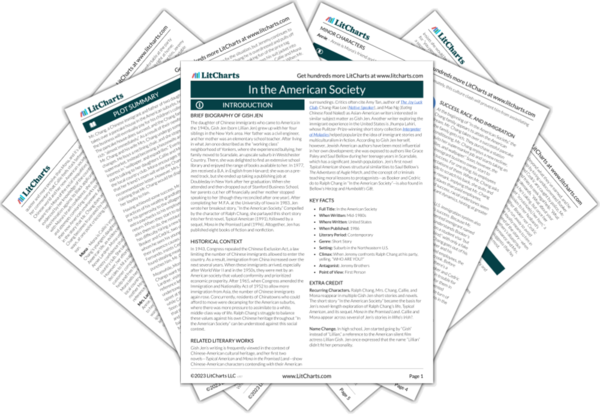At the beginning of “In the American Society,” the Chang family appears to attain the American dream. Mr. Chang takes over a successful pancake business, and the family gets rich. They purchase a station wagon with air conditioning, Mr. Chang enjoys a new recliner, and Mrs. Chang quits her supermarket job and starts taking an interest in “espadrilles, and wallpaper.” Soon, however, the realities of being an immigrant business owner start to puncture Mr. Chang’s success. For one thing, his employees take offense to his expectations of them. When Mr. Chang asks the headwaitress Gertrude to scratch his back, she quits and makes a racially insensitive remark, implying that Mr. Chang treats his workers more like slaves than paid employees. Despite Mr. Chang’s outward success, racial undertones seem to have emerged in the restaurant dynamics, hinting at greater disharmony to come.
The challenges presented by the U.S. immigration system also threaten to undermine Mr. Chang’s success. Because Mr. Chang empathizes with an undocumented immigrant named Booker, he hires him as a busboy. He understands Booker’s struggle—the busboy came to the U.S. on a student visa “but had run out of money and was now in a bind,” with only a fake Social Security card to his name—so Mr. Chang goes out of his way to help the new hire. Even though Booker and his undocumented friend Cedric prove to be good employees, the other staff resent them and claim Cedric is a crook. Before long, the head cook Fernando is stealing meat, there’s a fistfight, and the immigration authorities put Booker and Cedric in jail. Even though Mr. Chang himself doesn’t get in trouble for hiring the men, his failure to successfully advocate for them in the long run suggests that his sympathy to undocumented workers is a dead end for his business. The unfortunate turn of events at the pancake shop, spurred on by racial tensions in the kitchen and the reckoning of harsh immigration policies, illustrates that immigrant business owners aren’t fully in control of their own success. Rather, broader cultural and political pressures can make comfort and success precarious for immigrant business owners.
Success, Race, and Immigration ThemeTracker

Success, Race, and Immigration Quotes in In the American Society
There were occasions when the clear running truth seemed to eddy, when he would pinch the vinyl of his chair up into little peaks and wonder if he was doing things right. But with time he would always smooth the peaks back down; and when business started to slide in the spring, he kept on like a horse in his ways.
“You know, the Chinese have a saying,” said my mother. “To do nothing is better than to overdo. You mean well, but you tell me now what will happen.”
“So what else I should do?” My father threw up his hands. “Those are my boys.”
“Your boys!” exploded my mother. “What about your family? What about your wife?”
My father took a long sip of tea. “You know,” he said finally, “in the war my father sent our cook to the soldiers to use. He always said it—the province comes before the town, the town comes before the family.”
“A restaurant is not a town,” said my mother.
“Maybe this suit not fit me,” fretted my father.
“Just don’t take your jacket off,” said the salesgirl.
He gave her a tip before they left, but when he got home, he refused to remove the price tag.
Of course, my father tried to eat a cracker full of shallots, and burned himself in an attempt to help Mr. Lardner turn the coals of the barbecue; but on the whole, he seemed to be doing all right. Not nearly so well as my mother, though, who had accepted an entire cupful of Mrs. Lardner’s magic punch and indeed seemed to be under some spell. […] I watched my mother take off her shoes, laughing and laughing as a man with a beard regaled her with navy stories by the pool. Apparently he had been stationed in the Orient and remembered a few words of Chinese, which made my mother laugh still more.
Jeremy began to roar. “This is my party, my party, and I’ve never seen you before in my life.” My father backed up as Jeremy came toward him. “Who are you? WHO ARE YOU?”
“Take off your shirt.”
“I do not taking orders like a servant,” announced my father stiffly.
“Take off your shirt, or I’m going to throw this jacket right into the pool, just right into this little pool here.” Jeremy held it over the water.
“Go ahead.”
“One hundred twelve-fifty,” taunted Jeremy. “One hundred twelve …”
My father flung the polo shirt into the water with such force that part of it bounced back up into the air like a fluorescent fountain. Then it settled into a soft heap on top of the water.
“You girls are good swimmers,” he said finally. “Not like me.”
Then his shirt started moving again, and we trooped up the hill after it, into the dark.











